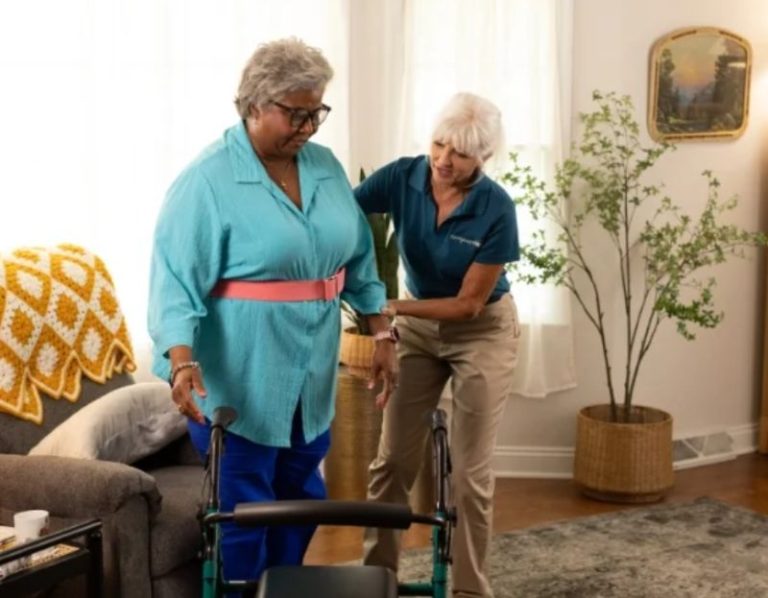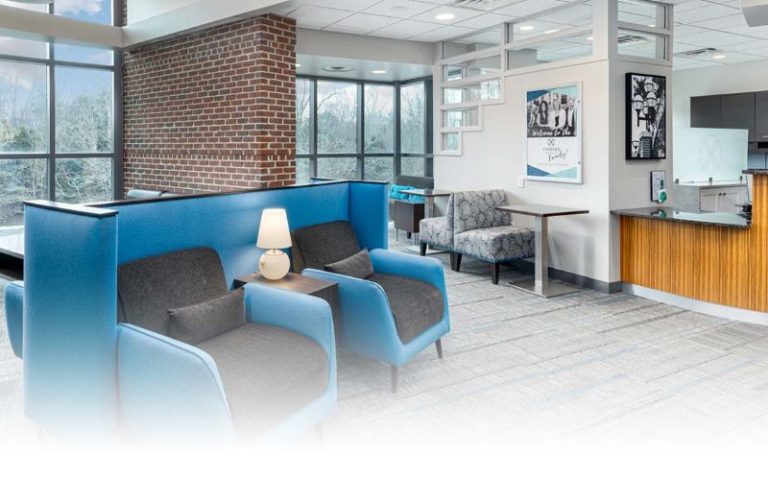

How do you determine the best care choice for your elderly relative?
Families must make one of their most important decisions when choosing between assisted living and nursing homes. Choosing the appropriate senior care environment generates enhanced quality of life while providing adequate medical support and maintaining financial stability.
Making this choice can feel overwhelming. Different choices provide unique benefits but making the wrong decision can affect both your loved one’s health and happiness as well as your financial situation.
The right environment makes all the difference.
This article explains essential details about assisted living and nursing homes to enable you to make a knowledgeable decision that suits your family member’s specific requirements.
What you’ll discover:
- Understanding Care Options
- Key Differences in Care Levels and Services
- Cost Comparisons and Financial Considerations
- Evaluating Needs
- Future Planning
Understanding Care Options
What Is Assisted Living?
Assisted living creates a supportive space for elderly individuals who require help with day-to-day tasks but do not need serious medical attention. Residents who explore assisted living in Tigard and other communities discover that these facilities provide a combination of independent living with available support.
These communities focus on:
- Assisted living communities deliver assistance for daily personal tasks including bathing, dressing and medication administration
- Offering housekeeping and meal services
- Creating social environments with activities and events
- Maintaining a home-like atmosphere that promotes dignity
The widespread popularity of these facilities makes sense because they enable residents to retain their personal independence.
Pennsylvania residents also have an option to receive professional support through home care services that adapt to each individual’s lifestyle and health needs. Families considering senior care in Philadelphia, PA can find home care providers who deliver daily assistance, companionship, and medical oversight in the comfort of one’s own house. This approach enables older adults to remain in familiar surroundings while still receiving essential care tailored to their personal requirements.
What Are Nursing Homes?
Skilled nursing facilities which go by the name nursing homes deliver advanced medical care for people with complicated health issues or patients who need recovery time after surgery or sickness.
These facilities typically offer:
- 24/7 nursing care from licensed professionals
- Management of complex medical conditions
- Nursing homes provide rehabilitative support through physical therapy services alongside occupational therapy and speech therapy for residents.
- Assistance with all activities of daily living
Residents must receive an official physician’s recommendation before they can be admitted to nursing homes as opposed to assisted living facilities. The need for this requirement comes from the fact that residents require medical oversight that other facilities cannot offer.
Key Differences in Care Levels and Services
Making the right choice depends on understanding the core differences between these two options. Let’s explore what sets them apart.
Medical Care Differences
The primary difference between assisted living and nursing homes is the level of medical care available.
Assisted living facilities provide:
- Medication management
- Basic health monitoring
- Transportation to medical appointments
- Emergency call systems
Nursing homes provide:
- 24/7 skilled nursing care
- Complex medication administration
- Wound care and other specialized treatments
- Nursing homes deliver ongoing treatment and support for residents with diabetes or heart disease.
A nursing home becomes the better choice for your loved one when they need constant medical treatment for multiple chronic conditions. Assisted living facilities present the ideal solution for those who require periodic assistance with medicine management and doctor visits.
These places are equipped to deal with every types of dementia and other conditions that require specialized care. Trained staff provide personalized support while creating an environment that prioritizes safety, comfort, and dignity for residents.
Living Environment Differences
Both the atmosphere and physical layout of these facilities show a substantial difference.
Assisted living communities typically offer:
- Private apartments or rooms
- Common areas for socializing
- Restaurant-style dining
- More home-like furnishings and décor
Nursing homes usually feature:
- Hospital-like settings with medical equipment
- Shared rooms in many cases
- More institutional meal service
- Staff stations and medical supply areas
Independence and Lifestyle
Different residential options provide varying degrees of lifestyle and independence.
In assisted living, residents typically:
- Set their own schedules
- Choose activities
- Maintain personal autonomy
In nursing homes, residents usually:
- Follow structured schedules
- Have limited mobility options
- Have less daily control
Cost Comparisons and Financial Considerations
Financial considerations usually play a decisive role in making this choice. Potential residents must carefully evaluate the substantial financial difference between these options.
Cost Differences
These two choices show a substantial price difference.
- The monthly median cost for assisted living facilities stands at $5,190.
- The median monthly cost for private rooms in nursing homes stands at $10,646.
The cost of nursing homes is generally twice as much as assisted living expenses. The significant disparity exists because nursing homes require more intensive medical care and staff as well as specialized equipment.
Payment Options
Long-term planning requires thorough knowledge of available payment options.
For assisted living:
- Most costs are paid out-of-pocket
- Long-term care insurance may cover some expenses
- Some states have Medicaid waiver programs
- Veterans benefits may apply in some cases
For nursing homes:
- Medicare provides coverage for nursing home stays that last up to 100 days.
- Eligible senior citizens receive long-term care benefits through Medicaid.
- Private pay is still common
- Long-term care insurance may apply
The financial viability of different options depends primarily on your loved one’s financial resources and their qualification for government assistance programs.
Evaluating Needs
You should carefully evaluate your family member’s needs before deciding what to do.
Medical Needs
Start with a thorough medical evaluation:
- Current health conditions
- Medication requirements
- Need for skilled nursing
- Cognitive status
A healthcare provider can assess whether your loved one requires constant medical supervision or just limited assistance.
Daily Living Activities
Evaluate independence with:
- Bathing and hygiene
- Dressing and grooming
- Meals and eating
- Mobility
- Toileting
A nursing home becomes a reasonable choice when extensive support for physically demanding tasks is necessary. Assisted living provides sufficient support for those who require minimal help.
Social Needs
Consider:
- Desire for interaction
- History of isolation
- Important routines
- Activity preferences
Assisted living facilities provide more opportunities for independent social interactions that support emotional health.
Future Planning
Think about how your loved one’s needs will evolve throughout time.
- Will their medical conditions worsen?
- Is their cognitive status stable or declining?
- At some point they may require nursing home care instead of assisted living.
Assisted living facilities charging $5k/month can meet basic dressing assistance requirements for seniors but persistent health issues require nursing homes which cost $10k+/month for clinical care.
The senior housing market grows as baby boomers who will be between 57–75 years old in 2025 represent 21.19% of the United States population.
Certain facilities provide seamless care transitions within their community to adapt to changing needs and minimize the distress from multiple relocations.
Making Your Choice
Follow these essential steps when you finalize your decision.
Visit Facilities
Nothing replaces seeing facilities in person:
- Tour each option thoroughly
- Watch how staff interact with residents
- Sample meals and observe activities
- Talk to current residents and families
Location Matters
Consider practical factors:
- How close will family visitors need to travel to reach the facility?
- Will your loved one be able to continue receiving care from their present doctors?
- Will your loved one recognize their surroundings or experience unfamiliar territory?
Staff Quality
The quality of care comes down to the dedication of the people who work there.
- Ask about staff-to-resident ratios
- Check training requirements
- Search for experience with staff who understand your loved one’s specific medical conditions
- Observe staff interactions with residents
Final Thoughts
The selection between assisted living facilities and nursing homes requires matching your loved one’s specific needs with the appropriate level of care. The choice between care options influences their medical condition alongside their life satisfaction and your financial situation.
Remember:
- Assisted living facilities provide necessary support to seniors who wish to maintain their independence.
- Nursing homes provide essential care for individuals with severe health conditions.
- The financial gap between assisted living facilities and nursing homes shows nursing homes demand double the cost.
- The appropriate decision reflects a balance between required care services and personal preferences while staying within financial constraints.
You’ll discover the optimal combination of care and comfort for your loved one through careful needs assessment and facility visits. This tough choice demonstrates your dedication to providing optimal care for your family members throughout their later years.


